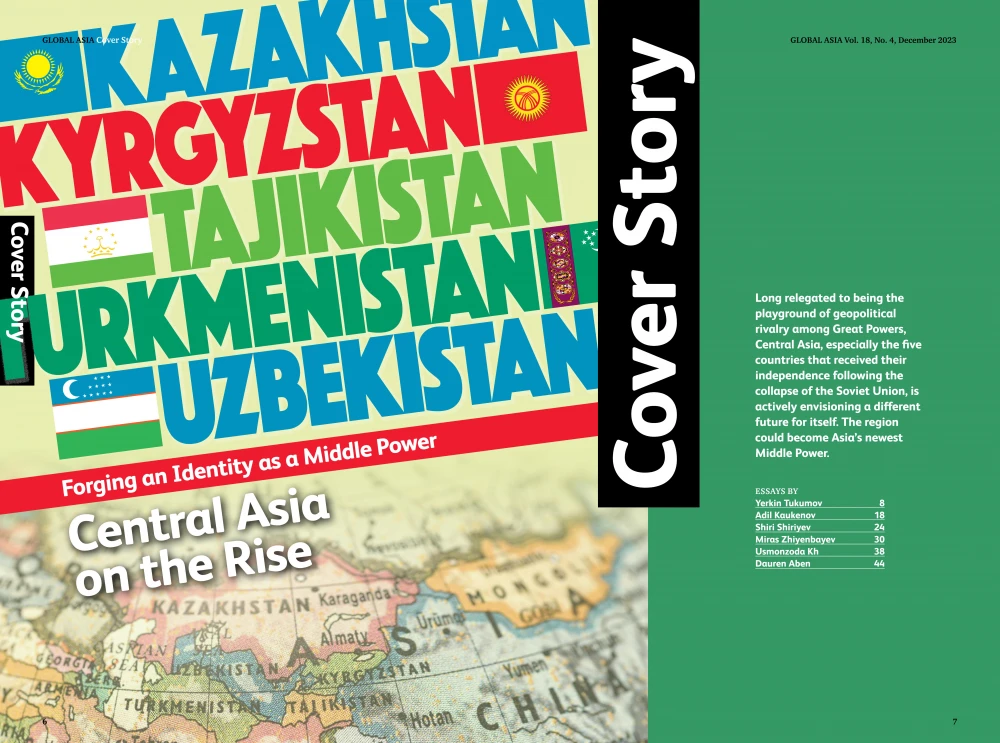
29/12/2023
2193
The Vital Role of the Caspian Sea
Perhaps no geographical feature is more important to the future of Central Asia than the Caspian Sea, rich as it is in natural resources and central to transport routes that link littoral states to each other and to regions beyond. It is also crucial as a focal point to bring together the states of Central Asia. Turkmenistan has played a key role in fostering that co-operation, writes Shiri Shiriyev.
Published: December 2023 (Vol.18 No.4)
About the author
Shiri Shiriyev is director of the Scientific Centre for Strategic Studies at the Institute of International Relations of the Ministry of Foreign Affairs of Turkmenistan.
TURKMENISTAN devotes a lot of attention to issues involving the Caspian Sea. It is one of the priorities of its foreign and domestic policies and a deliberate focus of the country’s leadership. The Caspian region is the most important geopolitical and geo-economic space on the Eurasian continent. The objective interests of coastal states as well as neighboring countries are concentrated here because the region is a major source of hydrocarbon resources, a transport and transit hub on a continental scale and a favorable location for expanding international trade. Along with this, the Caspian Sea is a unique natural complex with its own ecosystem, which requires an expansion of international scientific research.
Peace, security, friendship and mutually beneficial co-operation between littoral countries are the key elements for the stable development of the region, and the creation of new political and legal foundations of multilateral interactions in the Caspian region. Turkmenistan supports a comprehensive approach to a Caspian agenda that includes issues such as security, economic development, ecology, navigation, rational use of biological resources and emergency prevention.
In this regard, the first Summit of the Heads of the Caspian Littoral Countries, held at the initiative of Turkmenistan in April 2002 in Ashgabat, played a very important role. It laid a solid foundation for a systemic, multi-level and regular negotiation process in the Caspian region.
Moving Forward on Co-operation
In recent years, the leaders of the Caspian states have achieved notable results through far-sightedness, political will, mutual understanding and consideration of each country’s interests. The most important agreements in the political and diplomatic spheres involve a broad and meaningful legal basis for dialogue and sustainable co-operation. As a result, the Convention on the Legal Status of the Caspian Sea was signed by the presidents of the five Caspian states in 2018. This important document opened up major prospects for partnership between Turkmenistan, Russia, Iran, Kazakhstan and Azerbaijan.
A lot of work has been done and a lot of ground covered over the past 22 years in order to create the convention, not only for the Caspian states, but also for the entire Eurasian continent. The first meeting of the foreign ministers of Azerbaijan, Iran, Kazakhstan, Russia and Turkmenistan took place in 1996 to discuss Caspian issues and to co-ordinate approaches to develop the convention. During the negotiations, which had actually been going on for almost a quarter of a century, eight meetings of the heads of foreign affairs departments of the Caspian states were held, the last of which took place in Aktau on the eve of the fifth Caspian Summit on Aug. 11, 2018.
The Convention on the Legal Status of the Caspian Sea is designed to regulate the relations of all five Caspian states. It stipulates that the bottom and bowels of the mineral-rich Caspian will be delimited according to the sectorial principle, while the water area itself will be divided into internal and territorial waters, fishing zones and common water space. By that time, the Agreements on the Conservation and Rational Use of Aquatic Biological Resources had been signed at the Astrakhan summit on Sept. 29, 2014, and were already in force.
At the fifth summit of the heads of the Caspian states, issues of strengthening co-operation in the humanitarian sphere were raised. The parties agreed to hold consultations on the development of tourism in the Caspian Sea region, the organization of cultural exchanges, media forums, youth gatherings and sports competitions. At the same time, Turkmenistan announced another important initiative — the creation of a regional transport/logistics center to improve partnerships in the field of transport.
An important clarification in the convention is that the laying of pipelines on the seabed of the Caspian Sea is the prerogative of the parties through whose territory they pass. In addition, the parallel environmental pact implies that other littoral states can influence infrastructure projects in the context of environmental protection.
Over the years, a solid package of five-sided agreements on specific areas of activity in the Caspian Sea region have been signed. Nevertheless, it is necessary to focus on solving the practical problems of pan-Caspian development in order to make further advances.
Among them, the most important is providing a powerful push toward interaction in the energy sector. According to the data of geologists on the proven reserves of the Caspian littoral countries, the subsoil of the Caspian and adjacent territories hold large reserves of hydrocarbons. In addition, the US Geological Survey (USGS) has calculated that the Caspian contains 20 billion barrels of oil and 243 trillion cubic feet of natural gas to be explored.
The efficient use of these natural resources will provide a strong impetus for the dynamic growth of national economies, not only of the coastal states, but also of neighboring countries, providing conditions for the creation of new infrastructure, the construction of industrial facilities and the further prosperity of the peoples of the coastal countries.
Returning to the convention, it is necessary to note its importance in preventing the presence of armed forces of extra-regional powers in the Caspian Sea region. The key principles of this decision are to ease tensions in the region and intensify intra- and inter-regional economic co-operation.
Defense and Energy Security
Thanks to this favorable environment, Caspian Sea ports are being upgraded, including the Turkmenbashi International Sea Port, the largest and most modern in the Caspian, which is an important transport and logistics hub for the Black Sea basin, the South Caucasus and Central Asia. Even warships, submarines and other military vessels of Caspian states that pass through the territorial waters do not have the right to enter ports and anchor within the territorial waters of another state. The exception is cases where “there is appropriate permission for this or it is necessary due to force majeure or distress, or to provide assistance to people, ships and aircraft in emergencies.”
The signing of the Convention on the Legal Status of the Caspian Sea also was an important step toward global energy security. All further issues in the region will be resolved based on this document and the agreements concluded at the Caspian summits.
The Caspian is located at a crossroads. The territories of the Caspian states have direct access in the east to the Asia-Pacific region; in the west to the Black Sea and the Mediterranean; in the south to the Near and Middle East; and in the north to the coast of the Baltic Sea. In short, the Caspian countries occupy a key geographical space. This configuration offers prospects for creating sustainable routes along all major geographic azimuths. However, in order to function effectively, the Caspian states have to establish a well-functioning transport-communication system with each other, to define clearly algorithms of actions and to work more actively on plans for interaction in this area.
All this would be aided if a Caspian regional logistics center co-ordinated the joint activities of the Caspian states in the effective use of transit and transport corridors connecting the Eurasian continent.
Diversifying Resource Development
The Caspian economic strategy of Turkmenistan is based on the implementation of large-scale and long-term projects in such areas as energy, industry, transport and trade. Thus, Turkmenistan is actively developing deposits of hydrocarbon resources not only on the shelf of the Caspian Sea, but also in that part of the Caspian zone that is under its jurisdiction. In close co-operation with foreign companies, factories are being built on the Turkmen coast of the Caspian Sea to process hydrocarbon raw materials and produce products such as mineral fertilizers, polymers, liquefied gas and various types of oil products.
Turkmenistan, which is committed to diversifying energy flows, has expressed its readiness to continue co-operation with European partners on the implementation of the Trans-Caspian pipeline project. The idea for its construction, initiated by Turkmenistan, was initially considered not just as an economically and commercially viable project, but also as a key condition for ensuring global energy security and sustainability on the basis of equal consideration of the interests and benefits of producers, consumers and energy transit countries.
Based on national programs for socio-economic development, Turkmenistan is working to create a solid foundation for an industrial society. At the same time, the country is developing a modern and extensive transport and communication network. In recent years, thousands of kilometers of roads and railways have been built, which are important links in regional and international transport corridors.
In 2018, the new Turkmenbashi International Sea Port began operations with a capacity of 25 million to 27 million tons of cargo per year. In a short period, the merchant marine fleet of Turkmenistan was created, with modern tankers, dry cargo ships and ferries.
The Marine Fleet of Turkmenistan offers services for refueling foreign vessels arriving at Turkmenbashi with diesel fuel. The refueling service is offered not only at the berths of the port of Turkmenbashi, but also at the so-called 78th offshore section, which significantly saves time and allows ships to immediately go on a given route after refueling. Bunkering is also carried out by vessels that fuel foreign ships as well as supply them with drinking water and food.
International Co-operation
High-level political involvement by Caspian countries on issues involving international trade and economic integration will ensure active interaction with the United Nations Economic Commission for Europe, the United Nations Economic and Social Commission for Asia and the Pacific, the World Trade Organization, and other specialized international bodies. Top government officials in Caspian countries also bring accumulated experience of working with such regional associations as the Economic Cooperation Organization, the Shanghai Cooperation Organization, the Commonwealth of Independent States, and so on.
The quality of further development in the Caspian region depends directly on multi-format co-operation and the application of high-tech innovations. To achieve this goal, Turkmenistan has proposed the creation of an international innovation and technology center, where scientists and specialists from the Caspian states, as well as other countries, will be able to conduct their research and develop models of innovative partnership covering all aspects of Caspian issues — energy, industry, logistics, infrastructure and the environment.
As for ecology, it is one of the most important priorities in the Caspian region. Therefore, it was no surprise that the first document signed in 2003 by all the Caspian states was the Framework Convention for the Protection of the Marine Environment of the Caspian Sea (the Tehran Convention). Three years later, on Aug. 12, 2006, it entered into force. Since then, this date has been celebrated in the region as the Day of the Caspian Sea.
In May 2014 in Ashgabat, at the fifth Conference of the Parties to the Tehran Convention, the ministers of environmental departments of the Caspian states adopted the Protocol on the Conservation of the Biological Diversity of the Caspian Sea (the Ashgabat Protocol). In September of the same year, at the fourth Caspian Summit in Astrakhan, a number of agreements were signed, including the previously mentioned Agreement on the Conservation and Rational Use of Aquatic Biological Resources of the Caspian Sea, initiated by Turkmenistan. At the fifth Caspian Summit, held on Aug. 12, 2018 in Aktau, two more important documents were signed. These were agreements in the areas of trade, economic and transport interaction in the Caspian Sea.
By and large, the regular Caspian summits and the Caspian Economic Forum have played a major role in the implementation of important mutually beneficial projects, to saturate the decisions taken by the presidents of Azerbaijan, Iran, Kazakhstan, Russia and Turkmenistan with practical content. In addition, such multilateral interaction in the Caspian has made it possible in the recent past for national economies to eliminate the negative consequences caused by the global financial and economic crisis, the coronavirus pandemic and purely regional processes, the solutions for which require joint efforts.
Seventeen years have passed since the signing of the first five-sided document on ecology, but even today, science plays a special role in preserving the ecological balance of the Caspian Sea and its unique biodiversity. This means that all economic projects in the Caspian basin must be carried out on the basis of international environmental standards.
Taking into consideration the current situation, Turkmenistan is committed to the creation of a new Caspian environmental program with measures aimed at the conservation and rational use of the rich natural resources of the Caspian Sea. This program will monitor the environmental situation in the Caspian Sea and formulate appropriate recommendations to the governments of the coastal countries.
Shrinking Water Levels
To date, the most acute problem is associated with a decrease in the area of the Caspian Sea. The sea level is now close to its lowest point since instrumental observation began. In the last quarter of a century, the water level has decreased by almost two meters; as a result, the sea retreated from the coast in some countries by hundreds of meters. This is especially noticeable in the northern part of the Caspian.
There are two main drivers causing the sea level change: climatic and geological. But there is still no consensus on the reasons for the change in the level of the Caspian Sea, and therefore there is no way to predict with certainty the development trends in the future. Many experts note that the Atlantic and the Arctic mainly influence the climatic processes taking place in Eurasia, which determine the amount of precipitation and evaporation in the Caspian Sea basin.
It should be emphasized that about 130 rivers flow into the Caspian Sea. The main volume of inflow comes from the Volga (80 percent), Ural, Terek, Kura, Sulak and Samur rivers, as well as rivers on the Iranian coast. The main factors of river runoff are winter precipitation in the basins of the Volga and Ural rivers. The regulation of river flow affects the change in seasonal inflows to the sea, and as a result, the level of the Caspian Sea. It is well known that since the 1950s, after the construction of large reservoirs on some rivers flowing into the Caspian Sea, the distribution of water flow has changed.
Last year, the rate of sea level fall compared to the year before increased by 20 centimeters, according to the Coordinating Committee for Hydrometeorology of the Caspian Sea. In 2023, a further decline is expected as well as a decrease in the water content of the Volga, as the main supplier. Last year, for example, it was only 212 km3 per year compared to a norm of 238 km3 per year.
But the situation in the Caspian Sea is aggravated not only by a reduction of incoming water but also by the volume of silt brought by river water containing fertilizers including nitrogen and phosphorus, which determined the basis on which the Caspian ecosystem was formed. This led to the fact that fish, including sturgeon, which spawn mainly in the Volga, began to die out. At the same time, in some places uncontrolled use of seawater through desalination is allowed in large volumes for household needs.
There is therefore an urgent need to strengthen scientific co-operation to study the water balance of the Caspian Sea and accurately determine the objective causes of fluctuations in order to predict trends, which is of great importance both for the preservation of the ecosystem of the Caspian Sea and for the economies of the Caspian states.
That is why Turkmenistan has called for closer co-operation among Caspian states to solve problems related to the protection of water and biological resources, the conservation of the biodiversity of the Caspian Sea and the rational use of its natural resources. The First Caspian Economic Forum, held at the initiative of Turkmenistan in 2019 in Turkmenbashi, played an important role. The decisions taken at the forum created the basis for a long-term partnership of the Caspian countries, international financial institutions and investment funds. In addition, huge opportunities for the Caspian region in transport, energy, manufacturing, trade and other areas were identified.
Sea level fluctuations inevitably affect biodiversity, causing in some cases a massive kill of marine mammals, birds and fish. Thus, in 1997, 2000, 2022 and 2023, cases of mass mortality of the Caspian seal were recorded. In addition, the Caspian Sea is an area where migratory birds cross paths, which makes it possible for them to transmit various pathogens.
Sustainable Transport Corridors
Economic sustainability, energy and environmental security, as well as modern transport and logistics infrastructure in the Caspian states, are key factors for sustainability and progressive development, not only for our region, but also for neighboring countries and regions. An example of this is Uzbekistan, which, having no access to the sea, has received more diverse and profitable exits to the Caspian thanks to the expansion of the network of transport corridors.
Turkmenistan, bordering Iran, plays a key role in shaping the Uzbekistan-Turkmenistan-Iran corridor. It is also an important link for access by Central Asian states to the seaports of Turkey and the Mediterranean through the Trans-Caspian International Transport Corridor. Tajikistan can enter the port of Turkmenbashi only through Uzbekistan and Turkmenistan, so the transport interaction between these three friendly countries is mutually beneficial.
Turkmenistan considers its common future in the context of the future of the planet, in close co-operation with UN activities to achieve the Sustainable Development Goals. Turkmenistan is convinced that at present the main task of the Caspian states is the maximum use of the existing co-operation mechanisms, reflected in the Convention on the Legal Status of the Caspian Sea. In this way, the Caspian will become a sea of peace, friendship and mutually beneficial co-operation.
Source taken from here:
https://www.globalasia.org/v18no4/cover/the-vital-role-of-the-caspian-sea_shiri-shriyev
https://www.globalasia.org/v18no4/cover/the-vital-role-of-the-caspian-sea_shiri-shriyev


